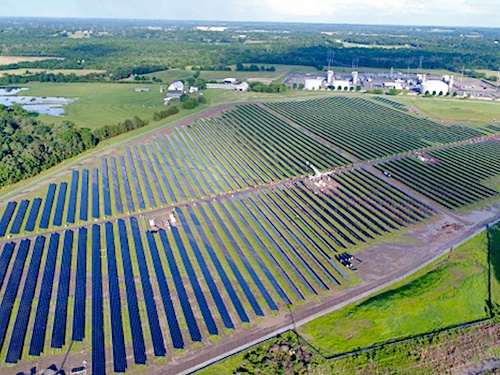
~ Press release issued by the Virginia Farm Bureau Federation
RICHMOND, Jan. 29 — Keeping the farm going sometimes requires the operator to leave it behind. And 100 of them did that on Monday for Virginia Farm Bureau Federation’s annual Legislative Day at the General Assembly in Richmond. While there, they met with lawmakers and advocated for legislation that affects agriculture.
Many urban and suburban legislative offices welcomed farmers to hear firsthand how wage issues and solar collection facilities on prime lands threaten operations.
There’s anxiety among farmers that urban representatives have a closed door to conversations about agriculture, said Martha Moore, senior vice president of VFBF governmental relations. However, positive relationships have been established with those state leaders through VFBF’s statewide series of roundtable discussions with farmers.
“And Legislative Day is just the next step in continuing to build that relationship,” Moore said. “These legislators have an open door to these conversations, even if we don’t agree on every issue.”
Complimentary snack bags packed with Virginia-grown, value-added agricultural products were distributed to each lawmaker.
Farmers from Northern Virginia met with the constituent services director for Sen. Russet Perry, D-Leesburg, a member of the Senate Agriculture, Conservation and Natural Resources Committee.
“I’m hoping Sen. Perry will vote no on taking away the local control of zoning for solar facilities,” said Loudoun County produce grower Avis Renshaw. “It’s crucial. Most of those facilities will go on open, easy land or forested land. Farms are the low-hanging fruit.”
While developing emission-free energy sources is encouraged, “‘All politics is local’ is doubly true in this situation,” Renshaw added.
Farmers advocated for SB 234, which promotes the installation of solar arrays only on parking lots.
Jakob Seely, a cattle and poultry grower and forestland owner, said Fauquier County farmers have proposed a local cap on solar projects. “It’s a plan to be pro-solar, with the least negative effects on farmland,” he said. But a loss of local control could upend that.
Farm Bureau is opposed to two House of Delegates bills aimed at increasing the minimum wage to $15 by 2026 and eliminating wage exceptions for farmworkers. VFBF state board member Barry Bates of Essex County said mentoring youth in farmwork allows them to grow into higher wages with experience.
“You’re their teacher while paying them too,” he explained. “If we set wages at $15 off the bat, they may not have that opportunity.”
Senate agriculture committee chair Sen. Dave Marsden, D-Burke, believes there may need to be a deeper discussion of labor issues.
“There’s talk about an amendment that allows the minimum wage requirements to take place in the second year of employment,” he said. “It can be a training wedge, because a lot of times these people are not going to come back.”
•••
RELATED ARTICLES
Farmers prepare to discuss agricultural priorities with lawmakers during Legislative Day Jan. 29
Wet weather saturates fields, lifts drought advisories in 49 counties – but not in Valley
Consumers seek locally raised beef as farmers and processors try to keep pace with demand
Above average rainfall during December, second-driest year in 55 years
Shenandoah Elementary among grant recipients from Virginia Agriculture in the Classroom
County appeals to Governor for ‘agricutural disaster’ relief from $5M in losses due to drought
Farmers and Virginia’s water health to benefit in new fiscal year
Report finds U.S. food and ag sectors’ impact exceeds pre-pandemic levels



Thank you for running this piece. The three bills under consideration in the Virginia legislature would take away counties’ rights related to zoning and land use. All decisions regarding where industrial scale solar,wind, data centers etc would be made by a three person board, one of who. Is a former lawyer with solar giant Nextera.
This means that, regardless of what county residents want, they may be forced to have a giant industrial complex aced wherever Richmond politicians want it.
Tell your legislators NO.
Not having electric power in the event of an attack on the US would be bad for everybody but Kathy.